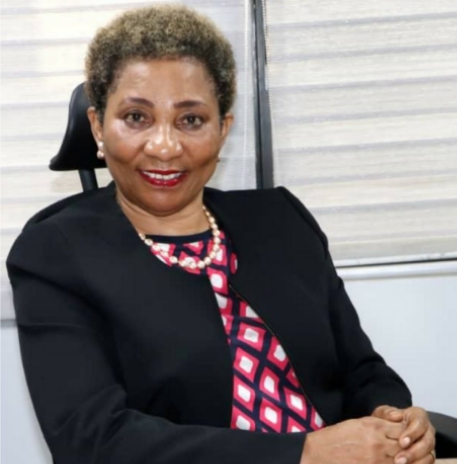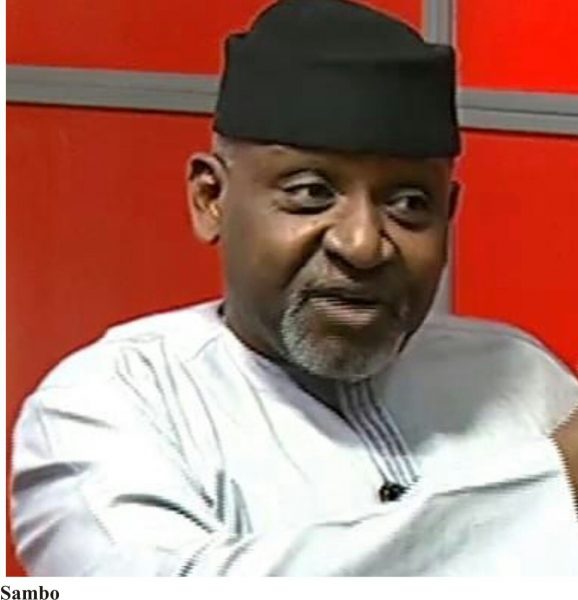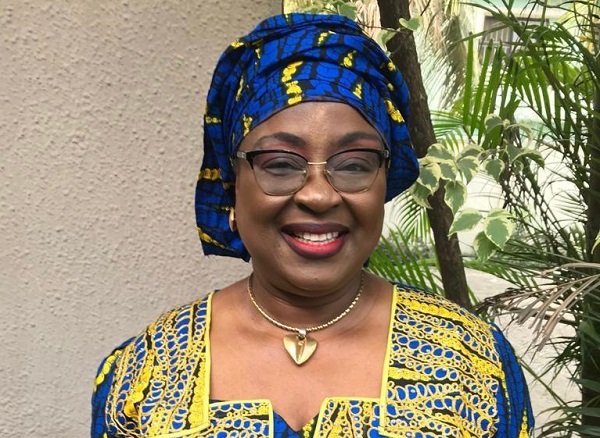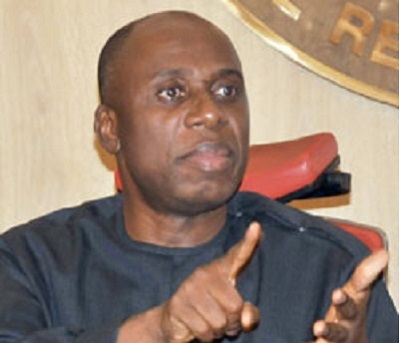How Political Interference Mars Nigerian Ports Sustainability – Ezeoke

By Kenneth Jukpor
Mrs. Eunice Ezeoke is the President of Women’s International Shipping and Trading Association (WISTA) Nigeria. In this interview with MMS Plus newspaper, Eunice also proffers practical solutions to a myriad of Nigerian port sector challenges. She reveals how political interference affects port administration and impedes good policies at government agencies. She also charts the course for a new efficient port system in the country. Enjoy it:
Lagos port access roads are characterized by gridlock, despite efforts in place to use other ports and the establishment of a taskforce to maintain order, the problem persist. What should be the holistic approach to solving this port access challenge?
Firstly, it is important to note that Apapa port was constructed over 100 years ago, Tin Can port was constructed almost 50 years ago as a result of gridlock on Apapa port. Port Harcourt port was constructed over 100 years ago. Onne port used to be a part of Port Harcourt port before it was fully made a port in the 1990s. Looking at this analysis, since the Tin Can port was constructed 50 years ago to dissipate the gridlock at Apapa, has there been an additional road connecting the ports since that time? The answer is no but ships have been growing in terms of their sizes and the nation’s cargo traffic has increased tremendously. The cargo exit infrastructure for the port has been the same road for over 100 years.
Ships have been growing in capacity, the business of loading and discharging have become sophisticated leading to speed in discharging cargoes but the roads remain the same. In fact, it can even be argued that the road shrunk because in those days railways assited in evacuating cargoes from Apapa to the North, the same way cargoes came from the North through Iddo rail terminal to Apapa. Also, there was underground drainage system that led to the seas.
Over the years, the rail system died and it is just been looked into by the present government but the roads remain same while the number of trucks also keep growing. It is important to note that Port Harcourt port is getting old and nothing has been done to improve the infrastructure at the port.
Does this mean the ports have reached their maximum capacity and the only solution would be creation of deep seaports?
Yes, this is an important aspect that nobody took note of, maybe because of the cost of building deep seaports. Every port has a lifespan. By the time the port is getting to half of its lifespan the country should locate a site for another port. This is because when a port is newly constructed it is expected that the port will give birth to a new community and this community would record economic and infrastructure growth as the port grows, especially the road infrastructure. At that point, a new port should be created.
For example, the Dublin port will expire in 2040. It means that by that time it would have reached its maximum capacity of operations. Nevertheless, they have started constructing a new port because they understand that it will take time and money to be built. By 2040, the port would have been completed and they would be integrating cargoes. The old port will be converted into either single cargo area or a tourist area. I have been privileged to tour around different ports across the world and I discovered that the old ports become parks but you will see signs that they were previously ports.
Unfortunately, there is nothing like this in Nigeria. Every solution that has been suggested today to solve this gridlock issue is just temporary. It is insignificant because whatever platform they are creating will still face the same road. So, what magic are they expected to perform. Those that think taskforce will solve this problem are not being realistic. The only permanent solution is to move the port to a new place that should have been identified 30 years ago. Today, we are talking about Badagry deep seaport, Ibaka deep seaport, Lekki seaport and others, that is the way to go. Nigeria is endowed with natural harbours.
Another problem is that our ports are mostly river ports. By the time we move to the deep seaports, we would cut off a lot of charges that are been charged. This is possible because channels will be shorter and towage would be cut-off; maintenance of channels soil and navigational aids will be reduced or cutoff, vessels will be coming in high speed directly to the port instead of pilotage and the additional charges.
Having spent decades at NPA, I’m sure some of these initiatives must have been brought up years ago. Why did the state of the ports remain this way?
NPA is autonomous but any government of the day is in control. The high cost of building deep seaports made the government shy away as they would rather want individuals to come into it or partner with them. So, these are some of the challenges.
The permanent solution to Lagos ports traffic gridlock is to move to the deep seaports that have the capacity in terms of road network, rail network and infrastructure to accommodate high level of cargoes as well as the human capacity that is needed.
Nobody is taking statistics of lives and properties lost and accidents other challenges from this overburdened port system. People have died because of containers falling on cars, these kinds of statistics need to be taken and it is an embarrassment to the country. You don’t see this in other maritime nations.
The waterway is another viable option for multimodal approach to port operations but the challenge is piracy. Despite lots of activities by NIMASA and the Nigeria Navy, we still have pirate attacks and lots security threats on the water ways, how can the nation address this issue?
Piracy is an international issue. However, it is unfortunate that the Gulf of Guinea (GoG) has become the most problematic area in the world. Piracy is as old as shipping, so we shouldn’t expect that it would be totally eradicated. Nevertheless, the current situation is not only vulnerable for seafarers but also an international situation which is bad for Nigeria and all countries in the GoG.
However, these pirates are human beings that have needs and challenges which led them to become pirates. We must have a holistic approach to addressing this menace. NIMASA and the Navy are doing a lot. NPA also recently purchased some patrol boats that was donated to the Navy to enhance surveillance activities on the waters but it is unfortunate that attacks by pirates continue every day.
I was in a function recently where somebody said these pirates are known and if the government truly wants to curb it they will. I found this statement worrisome and I believe that if the Navy is properly equipped and supported, these pirates aren’t above them.
People still hire private security which is Navy to escort vessels in and out of the Eastern ports. It is an embarrassment because the same Navy is statutorily responsible for security. The private shipping companies hire them to do the work that it is statutorily theirs.
The federal government can address this by instituting a legal instrument. The government also has to do follow up and not just stop at making a law. There must follow up to ensure the law is obeyed.
Recently, there have been calls to replace the Container Deposits paid by importers and freight forwarders with insurance. What’s your take on this?
If insurance is going to replace container deposit that would increase the cost of the insurance premium. So, it is like taking from party A to put into party B’s purse. The problem is that shipping companies in Nigeria are not transparent. You will hear all sorts of experiences concerning the non-refund of these deposits. So, I think there should be an understanding. There must be a clear policy on the part of the shipping companies concerning their containers because several importers carry goods and return the containers without getting the deposits.
For shipping companies, the absence of holding bays has been a major challenge. NPA tried to enforce this on several occasions but there has been no development on that. Why?
When a situation is bad no redemption, every effort you are making will not be effective and it wouldn’t have the overall impact. The situation has gone beyond redemption. No matter how much holding bays are provided and irrespective of there locations, the containers would eventually come out to the ports via the same roads. You discover that even if you allocate time for them to move, at that time there must be traffic.
Do you know that in a typical container port the entire Apapa is a terminal? For instance, the Port of Antwerp in Belgium; when we visited this port in a nation without crude oil. They had four refineries located in the port as at the time we visited. The seaport with refinery only handles petroleum products but they don’t have oil. Ships come into the port, they refine and ship out to other countries.
In Nigeria, we have the same port handling container, general cargo, oil products and almost all you could think of. We don’t have specialized ports strictly for containers. When we develop the identified deep seaports, Tin Can and Apapa ports could become specialized ports. Apapa port could become strictly dry bulk for sugar, salt and other items because the silos and conveyor belts are already there. Tin Can could be reserved for roro to handle vehicles while Kirikiri Lighter Terminal (KLT) could be for edibles such as fish and other food items. If the ports cannot be specific for one item, they should handle two or three items.
Imagine the number of tankfarms in Apapa and in Calabar where people are living. Recall the recent incident at Abule-Ado which is yet to be comprehensively explained. Nobody knows what happened; but it could have been prevented with proper planning. This unfortunate incident could happen in other densely populated areas with numerous tankfarms across the country.







